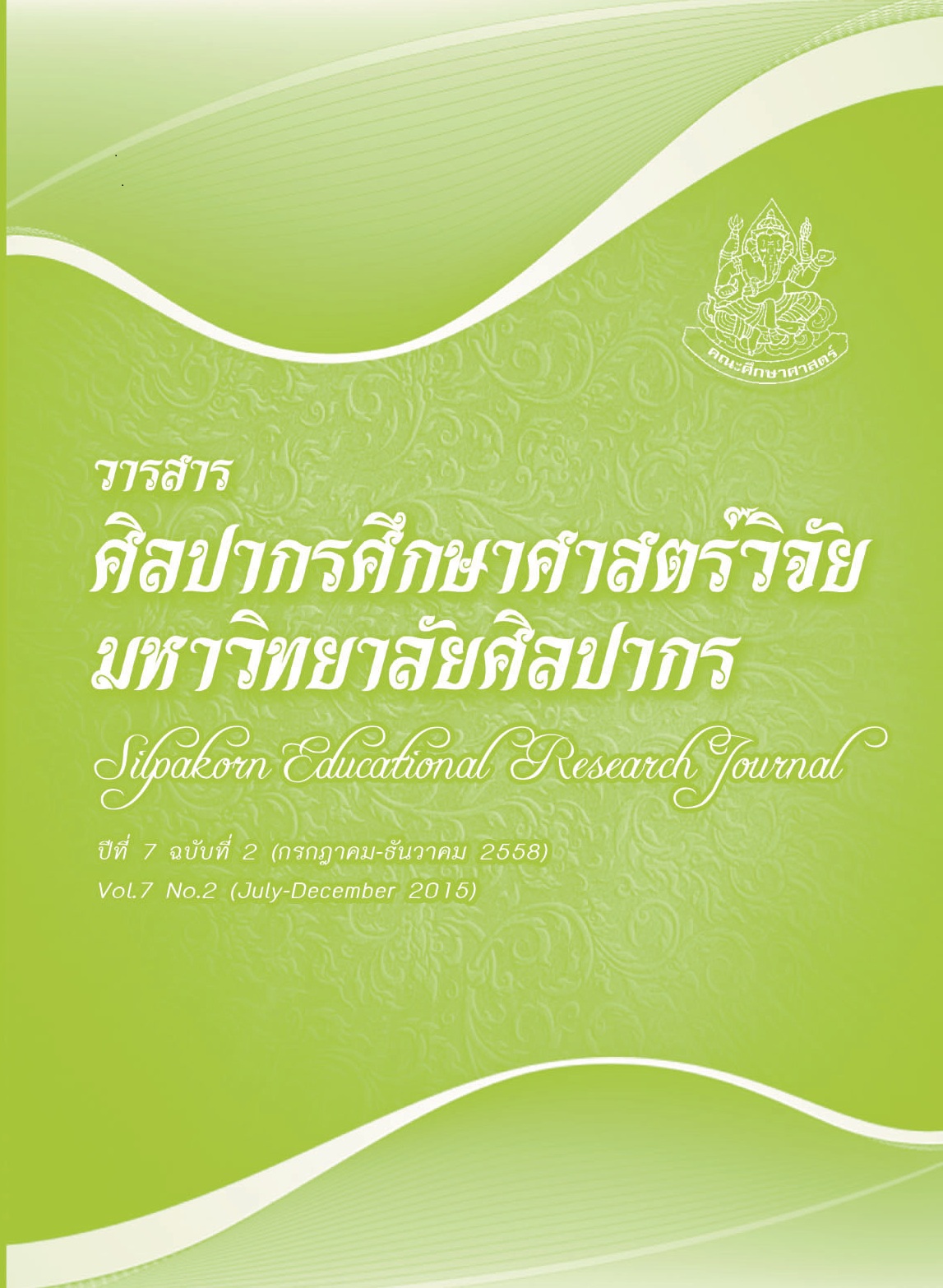การประเมินความต้องการจำเป็นเพื่อส่งเสริมสมรรถนะด้านการเรียนในยุคประชาคมอาเซียนของผู้เรียนโรงเรียนฝึกอาชีพกรุงเทพมหานคร THE NEEDS ASSESSMENT TO PROMOTE LEARNING PERFORMANCE OF ASEAN COMMUNITY FOR SUTDENT OF VOCATIONAL TRAINING SCHOOL IN THE BANGKOK METRO
คำสำคัญ:
การประเมินความต้องการจำเป็น / สมรรถนะด้านการเรียน / โรงเรียนฝึกอาชีพกรุงเทพมหานครบทคัดย่อ
การวิจัยครั้งนี้ มีวัตถุประสงค์ 1) เพื่อศึกษาสมรรถนะด้านการเรียนในยุคประชาคมอาเซียน ของผู้เรียนโรงเรียนฝึกอาชีพกรุงเทพมหานคร 2) เพื่อประเมินความต้องการจำเป็นเพื่อส่งเสริมสมรรถนะด้านการเรียนในยุคประชาคมอาเซียน ของผู้เรียนโรงเรียนฝึกอาชีพกรุงเทพมหานคร ขอบเขตการวิจัย เชิงคุณภาพ ได้แก่ ผู้ให้ข้อมูลสำคัญของโรงเรียนฝึกอาชีพกรุงเทพมหานคร จำนวน 6 แห่ง และข้อมูลเชิงปริมาณ ได้แก่ ผู้เรียนโรงเรียนฝึกอาชีพกรุงเทพมหานคร ประจำปี 2557 จำนวน 9,962 คน กลุ่มตัวอย่าง คือ ผู้เรียนโรงเรียนฝึกอาชีพกรุงเทพมหานคร จำนวน 379 คน ได้มาโดยวิธีการสุ่มตัวอย่างแบบแบ่งชั้น เครื่องมือที่ใช้ในการวิจัย คือ แบบสัมภาษณ์ และแบบสอบถาม ตัวแปรที่ศึกษา ได้แก่ ความต้องการจำเป็นเพื่อส่งเสริมสมรรถนะด้านการเรียนในยุคประชาคมอาเซียนของผู้เรียน โรงเรียนฝึกอาชีพกรุงเทพมหานคร จำนวน 7 ด้าน ได้แก่ 1) ด้านการสื่อสาร 2) ด้านประชาคมอาเซียน 3) ด้านเทคโนโลยีสารสนเทศ 4) ด้านกระบวนการทางวิทยาศาสตร์ 5) ด้านการประยุกต์ใช้ตัวเลข 6) ด้านคุณธรรม จริยธรรม และจรรยาบรรณวิชาชีพ 7) ด้านการประยุกต์ใช้ความรู้ และทักษะในสาขาวิชาชีพสู่การปฏิบัติจริง สถิติที่ใช้ในการวิเคราะห์ข้อมูล ได้แก่ ค่าความถี่ ค่าร้อยละ ค่าเฉลี่ย ส่วนเบี่ยงเบนมาตรฐาน ค่าดัชนีลำดับความสำคัญของความต้องการจำเป็น การวิเคราะห์เมทริกซ์ และวิเคราะห์ข้อมูลเชิงคุณภาพโดยการวิเคราะห์เนื้อหา
ผลการวิจัยพบว่า
1. สมรรถนะด้านการเรียนในยุคประชาคมอาเซียน ของผู้เรียนโรงเรียนฝึกอาชีพกรุงเทพมหานคร 1) สมรรถนะด้านวิชาชีพ มีความคิดริเริ่มสร้างสรรค์ รู้เท่าทันคน เหตุการณ์ และมองเห็นการณ์ไกล มีความสามารถและความถนัดในงานอาชีพมีทัศนคติที่ดีต่ออาชีพที่ทำ 2) สมรรถนะด้านความรู้ ทักษะ และประสบการณ์ มีความสามารถการบูรณาการและประยุกต์ใช้ความรู้ทางวิชาการที่ได้เรียนและได้ปฏิบัติ สามารถพัฒนางาน ตลอดจนติดตามความก้าวหน้าทางวิทยาการอยู่เสมอ 3) สมรรถนะด้านการใช้เทคโนโลยีสารสนเทศ มีความรู้ทั้งทฤษฎีและปฏิบัติ เกี่ยวกับเทคโนโลยีสารสนเทศ มีความรู้รอบด้าน เพื่อให้ทันต่อการเปลี่ยนแปลงของโลก 4) สมรรถนะด้านกระบวนการทางวิทยาศาสตร์ สามารถวางแผนปฏิบัติงาน วิเคราะห์ และประเมินผลอย่างเป็นระบบ 5) สมรรถนะด้านทักษะการสื่อสาร สามารถวิเคราะห์ข่าวสาร และมีพัฒนาการความรู้ในด้านภาษา สื่อสารภาษา หรือพูดได้ ในลักษณะของศัพท์เทคนิคของอาชีพนั้น ๆ 6) สมรรถนะด้านคุณธรรม จริยธรรม และจรรยาบรรณวิชาชีพ มีเจตคติที่ดีต่อการประกอบวิชาชีพ และความรับผิดชอบทั้งต่อตนเอง และสังคม 7) สมรรถนะด้านทักษะทางปัญญา พัฒนาทักษะในการคิดวิเคราะห์แก้ไขปัญหาในเบื้องต้น 8) สมรรถนะด้านทักษะการปฏิบัติ ต้องสามารถปฏิบัติงานได้จริง เรียนรู้การแก้ไขปัญหา และ 9) สมรรถนะด้านอื่น ๆ การพัฒนาเพื่อการค้นคว้า หรือสร้างนวัตกรรมใหม่ ๆ ให้สามารถแข่งขันกับต่างประเทศได้
2. การประเมินความต้องการจำเป็นเพื่อส่งเสริมสมรรถนะด้านการเรียนในยุคประชาคมอาเซียนของผู้เรียนโรงเรียนฝึกอาชีพกรุงเทพมหานคร มีสภาพที่เป็นอยู่ในภาพรวม อยู่ในระดับปานกลาง ( =3.12, S.D. = 0.89) มีสภาพที่ควรจะเป็น ในภาพรวม อยู่ในระดับดี ( =4.20, S.D. = 0.88) มีค่าดัชนีลำดับความสำคัญของความต้องการจำเป็น (PNIModified) ในภาพรวม = 0.26 โดยด้านประชาคมอาเซียน มีค่าดัชนีลำดับความสำคัญของความต้องการจำเป็นมากที่สุดเป็นลำดับแรก รองลงมาเป็นด้านการประยุกต์ใช้ตัวเลข และด้านเทคโนโลยีสารสนเทศ และผลการวิเคราะห์เมทริกซ์ในภาพรวม อยู่ในส่วนที่ 3 คือ ผลงานไม่ดี ต้องปรับปรุง
The main purpose of this study was to 1) studying the learning performance in the asean Community and 2) the needs assessment to promote learning performance of asean community for student of vocational training school in the Bangkok metropolitan area. Scope of research were the 6 principals of vocational training school in the Bangkok metropolitan area and the sample size of population was based on the Stratified Sampling model by the samples 379 of 9,962 students who studied at vocational training school in the Bangkok metropolitan area.. The tools used in this study were the interviews and questionnaires. The data variables were used by this research, were the needs assessment to promote learning performance of asean community for student of vocational training school in the Bangkok metropolitan area that contains 7 elements such as Communication Capacity, Asian communities, Capacity for Technological Application, Scientific process Capacity, The application of numbers, Moral and ethical performance of professions, Capacity for Applying Life Skills. Data were analyzed, using frequency, ratio, means, standard deviations, Priority need index, Decision Matrix and Analyzing Qualitative content.
The research findings are as follows:
1. The study of competencies of learning for support the students at of vocational training school in the Bangkok metropolitan area in the asean community found 9 components: 1) Professional performance - Creative, Person knowingly, Foresight, Professional ethic and skill. 2) Cognitive performance / Skill / Experience - Ability to integrate the knowledge and skill, Development of oneself in regard to learning. 3) Competency in the use of IT – Knowledge and skills in application of information technology for development of oneself in regard to ability for self-adjustment to keep pace with environmental changes. 4) Performance scientific process – Ability to raise an operational plan, Analysis and Evaluation systematically. 5) Communication skills performance - Skills and Language proficiency to exchange a technically information that based on user profession. 6) Moral and ethical performance of professions – A good attitude towards the professions and a responsibility to oneself and society. 7) Thinking performance - Capacity to properly eliminate problem, based on analytical, synthetic and systematic thinking for judicious decision-making. 8) Practice skills performance – Able to practical and learn to deal with the problem solving. 9) Other performance skills - Developed for research or creation of bodies of knowledge to create the innovation and can compete with worldwide.
2. The needs assessment of competencies of learning for the students at of vocational training school in the Bangkok metropolitan area in the asean community, the overall status quo was placed in the middle score ( =3.12, S.D. = 0.89) and the overall necessary conditions was placed in the high score ( =4.20, S.D. = 0.88). The overall PNI was 0.26 and the highest PNI score was the Asian communities. The second place was the Application of numbers and the third place was the Capacity for Technological Application dramatically. The overall result of the decision matrix was in the third section of four sections that mean low performance and must be improvement.





